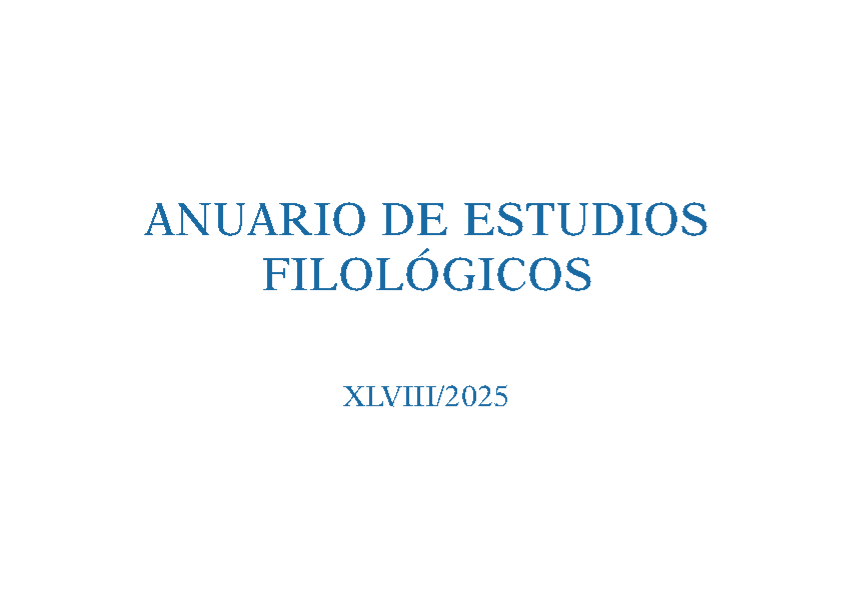“He tore it apart with a blast”: the other's vanishing through fiction in The Viper (2009) by Andrzej Sapkowski
DOI:
https://doi.org/10.17398/2660-7301.48.153Keywords:
The Viper, Andrzej Sapkowski, Otherness, Hate, FantasyAbstract
This article reflects on the harrowing process of dehumanisation and deprivation of individuality that, unfortunately, occurs in all war scenarios, both in reality and in fiction. Likewise, it will briefly point out how, in fantasy narrative, this process is highlighted in a much more evident and enlightening way, and will analyse the power of suggestion that literature exerts on the reader. To reach these goals, the novel The Viper (2009) by Andrzej Sapkowski has been chosen, in which the plot takes place during the Afghan-Soviet War (1978-1992) in a mythologised territory that has become legendary. As other researchers –and our own previous works on the author under study– suggest concerning the depersonalization of the other, specially of the other who comes from Eastern cultures, this article emphasises the inevitable dehumanisation that operates in any process of otherness, especially in war conflicts, and how literature is not necessarily an escapist balm. On the contrary, Sapkowski’s fiction aims to expose the weaknesses of a society that is weak in the face of the suffering of others. In order to achieve this purpose, and like the Polish author, it will be globally analysed how Western points of view condition our perception of the Eastern ‘enemy’, while at the same time these conclusions will be illustrated with passages from the novel.
Downloads
References
Asay, Jamin (2014): «Against “Truth”». Erkenntnis, 79, 147-164.
Bokulich, Alisa (2016): «Fiction as a Vehicle for Truth: Moving Beyond the Ontic Conception». The Monist, 99, 260-279.
Cammann, Schuyler (1957) : «Ancient Symbols in Modern Afghanistan». Ars Orientalis, 2, 5-34.
Centlivres, Pierre (1980): «Identité et image de l’autre dans l’anthropologie populaire en Afghanistan». Revue européenne des sciences sociales, 53, 29-41.
Dorronsoro, Giles (2011): Afghanistan. The Impossible Transition. Washington: Carnegie Endowment for International Peace.
Foucault, Michel (2004): Philosophie (anthologie). Paris: Gallimard.
Gadoin, Isabelle y Ramel, Annie (2013): «Liminality-Introduction». The Hardy Review, 15, 5-10.
Le Goff, Jacques (1988): Histoire et mémoire. Paris: Gallimard.
Livingstone, David (2016): «Paradoxes of Dehumanization». Social Theory and Practice, 42, 416-443.
Luckhurst, Roger (2012): «In War Times: Fictionalizing Iraq». Contemporary Literature, 53, 713-737.
Maoz, Ifat y McCauley, Clark (2008): «Threat, Dehumanization, and Support for Retaliatory Aggressive Policies in Asymmetric Conflict». The Journal of Conflict Resolution, 52, 93-116.
Melgar Blesa, Luis (2013): La deconstrucción del héroe en la «nueva novela de guerra» europea. Trabajo Fin de Grado. Universitat Pompeu Fabra (http://hdl.handle.net/10230/22046).
Mundkur, Balaji (1978): «The Roots of Ophidian Symbolism». Ethos, 6. 3, 125-158.
Richardson, John (2008): «Imagining Military Conflict during the Seven Years’ War». Studies in English Literature, 1500-1900, 48, 585-611.
Roy, Olivier (1985): «La stratégie soviétique en Afghanistan et ses limites». Politique étrangère, 50, 871-883.
Roy, Olivier (1988): «L’annonce du retrait soviétique en Afghanistan». Esprit, 138, 91-93.
Sapkowski, Andrzej (2007): Camino sin retorno. Madrid: Bibliópolis Fantástica.
Sapkowski, Andrzej (2020): Víbora. Madrid: Alamut.
Said, Edward (2010): Orientalismo. Barcelona: Debolsillo.
Struye, Tanguy (2022): «Afghanistan». Diplomatie, 113, 78-81.
White, Hayden (2003): El texto histórico como artefacto literario. Barcelona: Paidós.
Wilhelmy von Wolff, Manfred (1985): «¿Es Afganistán un Vietnam para la Unión Soviética?». Estudios Internacionales, 18.70, 302-334 (https://doi.org/10.5354/0719-3769.1985.15826).



